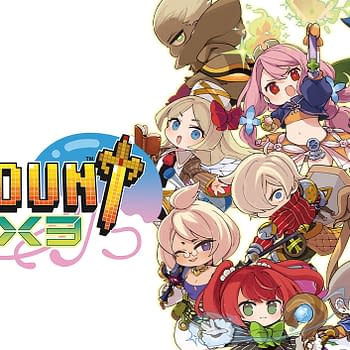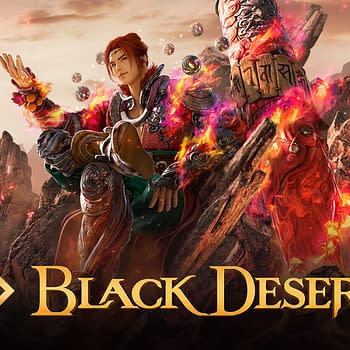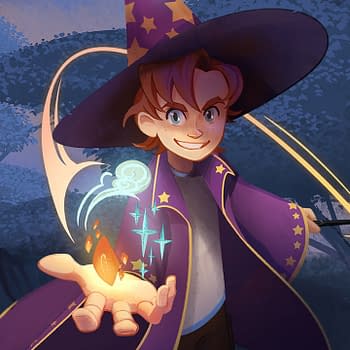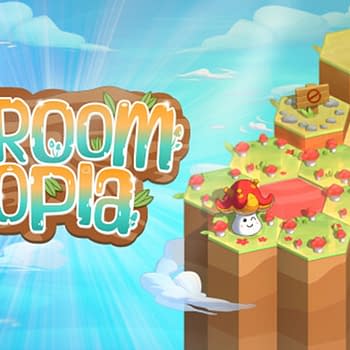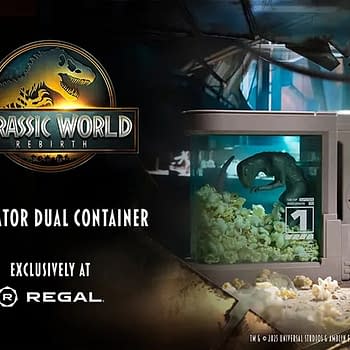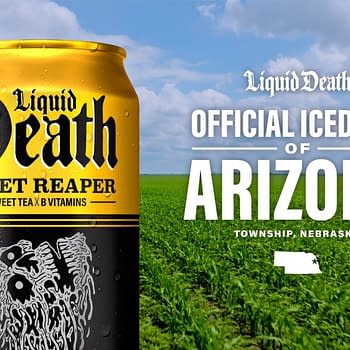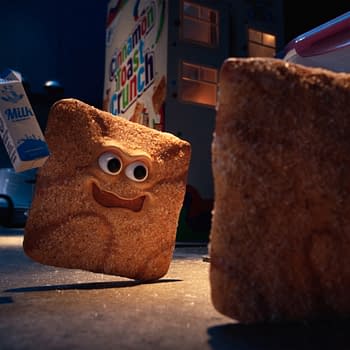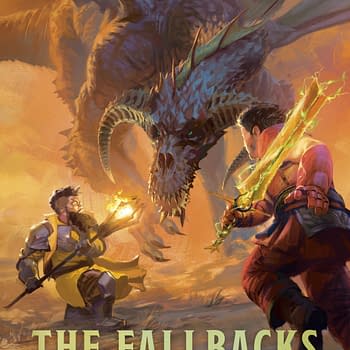Posted in: Books, Interview, Pop Culture | Tagged: Patrick Rothfuss, The Narrow Road Between Desires
A Chat With Patrick Rothfuss About The Narrow Road Between Desires
We had a chance to chat with Patrick Rothfuss about his latest book, The Narrow Road Between Desires, among other topics.
Article Summary
- Patrick Rothfuss discusses his new novella and Bast's deeper character exploration.
- Insights into Rothfuss's life changes and writing process during the pandemic revealed.
- Patrick Rothfuss Live series conceived as a COVID-safe alternative to book tours.
- Rothfuss delves into themes of consent and reality in fantasy through his work.
We've had the privilege of chatting with Patrick Rothfuss on a few occasions, and every time, there's a new wrinkle to the discussion that makes the chats even better. Recently, we got the chance to chat with him about his new book, The Narrow Road Between Desires, in which he explores a new story about one of his most beloved characters, Bast. But as it often is with Rothfuss, the book was only part of the story as we delved into his recent online interview series with fellow authors called Patrick Rothfuss Live, the history of the story that led to making this new book, and the occasional monotony of questions you get asked in interviews. All in good fun, of course! Below, we have the highlights of our nearly hour-and-a-half chat for you to enjoy.
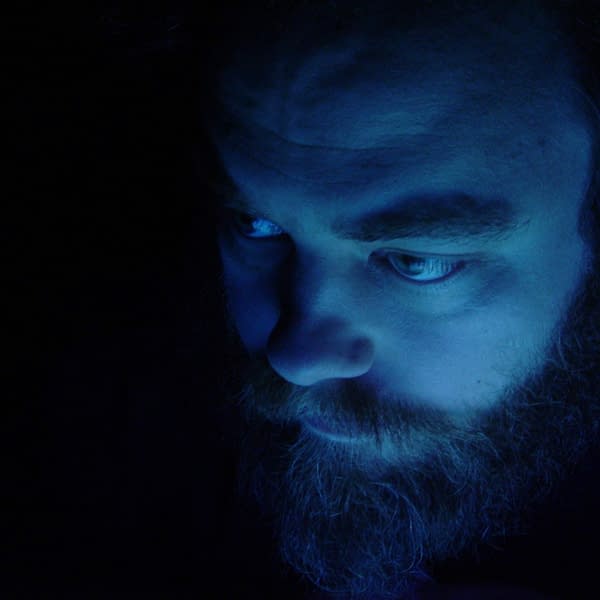
BC: Hey Pat! How have you been lately?
PR: That's a very kind question. And all the things you could ask. I was geared up to talk books and the genre and publishing and fairy tales. I remember saying maybe two years ago to somebody, do you remember when you could ask someone, "Hey, how are you doing?" And they would not have to foreground their answer? Do you remember when this was social noise, where it was sort of like birdsong? "How are you? I'm fine. You? Yeah, me too." So I felt bad for everyone else when COVID started because they were starting down a path to isolation that I started ten years before that. So I really empathized with folks, and mine wasn't government-mandated. It was just a weird, bad confluence of events that happened simultaneously around the release of my book.
A lot of my friends moved, my mom died, I got published, and I left my job, which was teaching and social, and stopped teaching fencing at the Y, kept trying to pull in my borders so I could be a professional writer and focus on my book and all of that. As a result, I went from kind of being an introverted but gregarious person with a few close friends and some hangouts to somebody who just never saw anyone. That was a transition a couple of years after I was published. And it took me because I am a bit of an introvert, it took me literally years to realize that I didn't have any friends anymore and that it was kind of slowly eroding my everything.
And so when COVID happened after, like, six months, everybody was still really fucking freaked out and legitimately so. But after a year, everyone was like, "Everything feels bad, and I'm tired, and is there a word for scared and lonely?" But of course, the better me was like, "Man, I hate that other people are having to experience this because it's the legit worst." So that said, COVID for me, I realized the mixed blessing [that] I realized I had friends, but I only saw them at cons, but of course, I wasn't traveling to cons anymore.
That said, certain other elements of my life did get better. For the first time in my life, I have a house that I'm proud of and lived in, and I've put things on the walls since I've been published. I'm not just sort of squatting somewhere. And other things are sort of on their way to being better, but it says a lot. Things have gotten better enough that I've been able to put out a book, and that feels good, I just wish I could feel good about it instead of feeling dread. I did a book, and it's really good, and I'm excited about it, and I'm proud of it.
So recently, you've been holding a conversation series on Twitch with different authors. I was kind of curious about what inspired that and what made you want to do that series.
The truth is, when Wise Men's Fear came out, they're like, "You want to tour the book?" And I'm like, "Whatever is good for you, because I owe you." They were really patient with me and let me finish it so that it's the best book. But nobody knew how successful that would be. Six hundred people showed up to the first event, and we would have run out of books if not for a lucky coincidence. A lot of the stops of the tour, we did run out of books, which is a nice problem to have. And I like hanging out with fans. I like doing the reading, and so I like touring, but I hate traveling. But it's a chance to touch base with a lot of the people who I owe my success to. It's fun meeting everybody, even if it's only for 20 seconds at a time. But again, COVID. And while it certainly has faded off, and I'm vaccinated to the nines, there's a difference. I don't put my mask on when I go into Starbucks to get my coffee anymore, but there is a huge difference between that and going on a tour and saying, "I would love to go through about 15 airports in a week and potentially be patient zero." Because to say nothing of the fact that if people turn out like they typically do, 600 people in a place, I actually feel it's ethically dubious for me to do that because people will get sick, and one of them will be me. Or say I tell everyone to wear masks, and then it's a fucking thing. Plus, I have comorbidities. It's extra dangerous for me to get COVID, and I've been very careful. So no tour, which is too bad.
If I do a stream, more people will see that than would go to any event, and it's a little more egalitarian, and people can go to several of the streams. They can't go to several of the signings, and honestly, I don't know how I would react being in a room with 300 people anymore. I would maybe need to work my way back up to that. The upside of working from home during COVID is I'm quarantined. I was quarantined before just by my job, but the downside is that nothing broke it up, and I got kind of afraid of being around people. Now I'm going to have to slowly reacclimate to being social. But it's a chance for me to hang out and talk with people that I haven't seen in a long time, and talk about fun things.
How did you go about choosing who'd be a part of this particular series?
Honestly, it's tricky because if you go to a con, they put you on a panel, and, if it's a good con, they say, is there anybody you don't want to be on a panel with? Because they don't want to put two people that don't like each other there. Or sometimes people have history. But similarly, when you end up on a panel, and you're like, "OH! I know these people!" that's how you meet other professionals and that's how you hear their ideas. So after being on so many panels over the last 15 years, I know who I have great conversations with and know who is really smart. I know who is lively, I know who will bicker with me, I know who is funny. I know who knows things that I don't know. So I want to listen to them. But also, especially if it's just going to be me and another person, or me or two other people, I don't want it just to be a series of older white dudes talking to each other. Don't get me wrong, some of my best friends are white dudes. But it gets a little samey after a while, so we try to bring in different people because it helps my brain not start to atrophy and die if I'm exposed to different concepts and perspectives and people like that.
So I would try for good representation to model that behavior for everybody else and also because it's worthwhile in itself. The other thing is sometimes the publishing team is like, "Hey, do you know about this cool person?"And I say, "Actually, I don't." Some of these are an opportunity for me to not just reconnect with an old friend, but maybe get a chance to meet a cool up-and-comer and help shine a light on them because a lot of people helped me out back in the day. It's a big combination of stuff. I actually really enjoy putting together panels. It's something I've done with some cons, like the con that I did with Hank Green—we worked on that together. It's fun assembling little teams that will have a good time talking about things.
This all leads at the very end of all these conversations to the release of the new book. I'm kind of curious what inspired you to do a new novella for the series?
Well… how about a semi-new novella? Semi-new because I like to write. I like to put out books, he said, probably surprising people. Just because I haven't been doesn't mean I don't want to. But life gets in the way. Least among those things is the fact that my publisher got sold. DAW used to have a partnership with Penguin, but then Penguin cut ties with them. Suddenly my publisher was rendered homeless. That meant DAW needed to find a new home, so I wasn't going to publish a book that would stay with Penguin because they were kicking us out. So that's the least of several things that sort of kept me from publishing a book, or contributed to that. So I'm like, "I should get back into the habit. Emerge from the COVID cocoon. Let's publish some books! What is achievable? What can we get done? Let's start slow." So I'd realized over the years that a lot of people didn't know about the novella The Lightning Tree that I wrote ages ago. Had you ever heard of the novella The Lightning Tree?
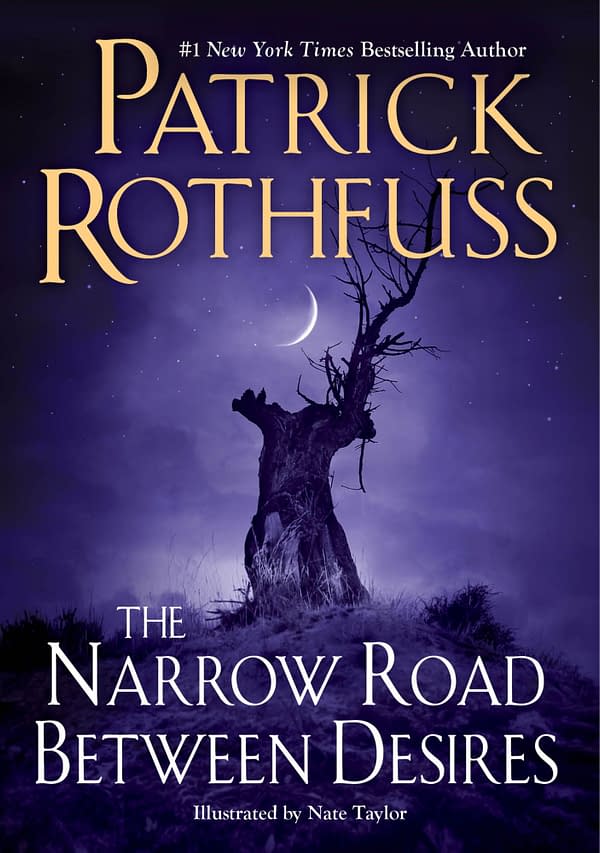
I had heard that you had works like this in the past, but I had not read it myself.
So even people who are kind of nuts for my stuff, they heard about Slow Regard of Silent Things. But that was a standalone novella published in its own little book. It hit the bookstores, but I was invited into an anthology called Rogues back in the day. After making an absolute hash of four different stories and none of them working out, I wrote something that… Want to hear the worst title ever? The working title was "Bast's Day." How's that for a sexy hook, fellas? But then I figured out, "No, it should be called The Lightning Tree. That's a good title." But I wrote it in a month, which for me is really fast, start to finish. It was about 20,000 words, even though it was just supposed to be a short story.
I realized that people, even people who really wanted to read my next thing… It wasn't that they were avoiding The Lightning Tree, it's that it was only in an anthology almost eight years ago, and they didn't know it was there. If they heard about it, they'd probably assume it was a short story, and they didn't realize it was a novella. So I'm like, "Well, I'll take that, and I'll add some illustrations. We'll do with that what we did with Slow Regard." Because that followed Ari—that was Ari's story. I'll do that because people are always like, "I want a Bast story," and I'm like, "There is a Bast story!" So I'll do that. I'll add some illustrations, I'll kind of tidy it up, I remember it being pretty good. Then I started working on it, and it came out. I read it. I thought, "Yes, I did a good job. I'm not embarrassed to have this in an anthology with all the other cool kids and Neil Gaiman. I held my own." But I read it now after all this time… I could do this a little better.
I showed it to maybe twelve people, but there was just not a lot of time to make corrections because I had already failed to write three or four other stories for this anthology. But looking at this time… Tolkien famously said he wrote the story from the beginning to the ending, and then from the ending back to the beginning. Because it wasn't until he got to the ending that he knew what the story was about. Once he knew what the story was about, he had to go back and make sure that the whole thing pointed in the right direction. I didn't get to do that as much with this story because it was so fast. So to jump to the end, it took me eight months of really intensive revision. I expected to maybe add a few things, maybe tweak the language a little bit, but I specifically told the publisher, "I am not padding this out just to make it longer." Instead, what happened is it took me eight months. I fully rewrote half of it, reorganized a bunch of things, and then added 15,000 words on top of it. So it's longer than Slow Regard now. It's almost a couple thousand more words; I bet if you count my author's note, it might be as long as a novel.
Nate [Taylor] signed on for between 12–20 illustrations; he did more than 40, I think more than 45. I love the illustrations in Slow Regard, but in so many ways, there's just so much more here. I don't want to say I like them better, but there's certainly more to like in a different way. So it turned into this huge thing. The reason I picked this is this was supposed to be like, "I should start publishing books. I should start with something achievable. I should start slow and manageable. I'm going to work with DAW's new partner, which is Astra; let's start with a smaller thing because you don't want your first project together to be a huge thing." But in some ways, it was because it's like, "Hey, I know you publish books, but how do you want to deal with 45 illustrations that you have to flow text around and put in a certain order?" So it ended up being a lot more work than I thought, but it also ended up being about ten times better than I thought it was going to be. So that's how we got this, and to prevent future confusion, we changed the name to The Narrow Road Between Desires.
In talking about those edits and building the book, considering it was a book about Bast, was there any extra care that you put into it as opposed to previous books or novellas, considering how popular that character is?
Yeah, same as anything. I only want to do it if it's important, but if it's important, you have to do it right. And so there's this pressure. He's easy to write and I already had the portrayal of him down. However, the thing that really ate up a ton of time and energy, probably like fully a third of all of my revisions and talking to beta readers—if you have the old fairy tales right, or you go back to fairy tales, you go back to mythology and you have supernatural creatures. You have, spoiler alert, fairies. You have fawns or Satyrs. There's no consent, they're always chasing nymphs, and the nymphs are like, "This sucks!" Which I mean, fair. I think it's about a toss-up between modern-world dealing with unwelcome sexual advances and the mythic world because they're like, "Oh, hey, Deities! This sucks. Can I get a little help?" And they're like, "You're a tree!" It's like, this isn't help, but it's "no, I screwed it up." Aristaeus chased Eurydice, and she was bitten by a snake, and that was Orpheus's Lady Love. But Pan was chasing a different nymph, and they turned her into a pine tree. These days, like a lusty fairy knows, these old fairy tales follow cultural rules. But consent was never a consideration in these stories, and especially if you follow in this, the fantasy tradition is really unfortunate in some of its sexist tendencies.
But things are different now, and fairy tales are always a weird remove from reality. But my books, I always wanted them to feel very real, and there's real people. I didn't feel good about Bast molesting his way through Temerant. That sucks. That's not how I want people to think of him, and I don't want to portray that, and I don't want to normalize that. Trying to address issues of consent with a real fairy creature who is driven by desire was a job of work that took so long. But also, I'm very happy with how it turned out.
What are you hoping fans take away from this latest novella?
I was probably a teacher before I was anything, and I'm not talking professionally. My mom lost track of me once at the zoo, and I was two and a half. She panicked, of course, because you got your kid and he's wandered away. She found me hanging out next to this dad and his kid, explaining to them the difference between Dromedary and Bactrian camels. So if there's a gene for pedantry, I have it. "But Pat," I hear you not say, "If you're a teacher, but you're not looking for anyone to take anything away from this, what do those things have to do with each other?"
If I had one thing I wanted you to take away from it, I could just tell you drugs are bad, which that's not a mission statement for me. A lot of drugs are real great. Don't rape. Yeah, I could stand behind that, but I could also just say it. That's a bumper sticker. I don't need to write 40,000 words and have all these illustrations and spend eight months of my life doing it. That's not what the book is about. The book isn't about anything because a preacher tells you a thing that you should think. I'm not that. A teacher shows you things and encourages you to think about them. Hopefully, just the concept of education, which means to lead out but not to lead toward. Right? I don't have you by the ear, you're going to come over here, and you're going to learn this specific thing. "Come see a thing. Come think about this." I'd like to encourage you to think in good, productive, healthy ways. That's the sort of teacher I am, which a lot of people probably wouldn't even recognize that as teaching, but that's how I've come to think of it. So, the book isn't about anything, and I'm always baffled when people ask questions like that. Or, "What's it for? What's the theme?" And I'm like, "No, it's a story. It's sort of like, 'What's your dinner about?' Well, it's about a pound and a half."
You've given me a lot to think about asking this question in the future.
I'm the only person that obsesses in this way about it. Because what used to happen is people would say, "What do you write about?" A lot of people do—they know what they're writing about. They know what they want people to carry away. Recently somebody said, "So, themes in your book?" And I'm like, "I don't have themes. This isn't high school English." And they're like, "Ha! But really, you got your master's in English Lit. What are the themes?" And they're like, "I think some of the themes are this," And I'm like, "Cool. I'm delighted that you have thought about my book and you've come up with ideas, and then I hope you talk to other people and you might agree or build on each other or have a friendly bicker." That's what I want. I want to write something worth thinking about and worth talking about that hopefully makes people happy, that brings them joy, or if not joy, then something joy adjacent. Peace would be nice. Perspective? I don't know. It's a question so foreign to my way of thinking that it probably isn't going to come across in text, but you can see by my expression, I just almost don't understand what the question means.





